In the past week, thousands of private U.S. embassy cables were released to the public, and Americans were treated to a barrage of petty politicking, snide comments, and Machiavellian backstabbing. Those were two separate events: the WikiLeaks dump, and Thanksgiving spent with families.
And we somehow have yet more holidays ahead of us. How will we endure? Well, it never hurts to come armed with an assortment of activities that won’t require diplomatic immunity to survive.
That’s why, every year, I recommend to my friends an assortment of board games that even the most curmudgeonly will love. Originally these picks were intended as gift suggestions, but more and more I notice my pals buying the titles for themselves in early December and bringing them along to social engagements. You can do that too, if you’d like. I don’t judge, much.
Regardless of how this list is used, the “Good Gift Game” moniker has stuck. And the criteria I use to make my selections remain unchanged:
- They are easy to learn, with rules that can be explained in less than five minutes
- They are entertaining enough that even the guy who comes in dead last has a great time playing
- They are quick, lack downtime, and require an hour or less to complete
And hey: Maybe if those embassy guys had spent more time playing games than grousing about Putin, the worst those messages would have revealed was the location of our Battleship.
Telestrations
USAopoly, 4 to 8 players, 30 minutes, $30
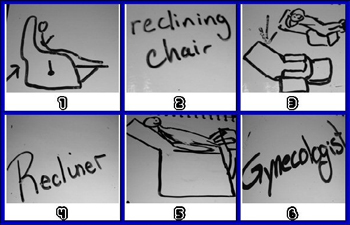
I am always a little irked when someone takes a perfectly good public-domain game and tries to monetize it with a commercial version. So when I first heard of Telestrations, I was dubious. “Why would anyone buy this?” I wondered. “It’s just Eat Poop You Cat with a box and a price tag!” Well, almost. Each player begins with a dry-erase notepad, on which they write a word chosen randomly from a huge deck of cards. Notepads are then passed one seat to the left, with the receiving player flipping to the next page and drawing a picture of the word they just saw. When pads are passed again, players fill the third page with the word they think best describes the picture from the second—and so on. By the time the sketchbooks have circumnavigated the table, the original word is typically nowhere to be found, often replaced by something utterly unrelated. So, yes, it is awfully similar to You Cat, and you may recognize the schoolyard game of Telephone in there as well. But I have to admit: The dry-erase pads and cards—not to mention the more appealing name—make this worth the purchase. Just be sure to ignore the scoring suggestions in the back of the rulebook. If you aren’t playing just to have fun and laugh until your sides hurt, you are doing it wrong. (more info)
Piece o’ Cake
Rio Grande Games, 2 to 5 players, 20 minutes, $30
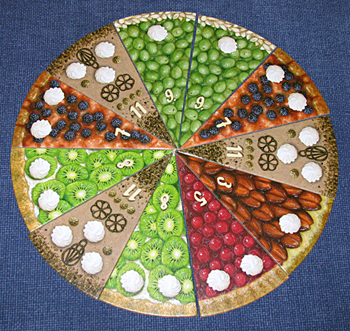
Here’s another example of an old idea turned into a fresh new game. Remember the splitting algorithm your father made you employ when you shared a brownie with your sister? One person cuts, the other chooses. That same formula is the raspberry filling inside Piece o’ Cake. Each round begins with the serving player receiving eleven cardboard cake slices, which come in a variety of flavors. The server then groups these into offerings, and is free to make the distribution as equitable (or not) as she wishes, perhaps even providing fewer servings than there are people playing. Afterward the other players choose which pieces they want, with the server going last. The goal of the game is to eat your cake and have it too—you score points both for slices you’ve consumed during play, and points for slices you’ve kept uneaten (assuming that you have more uneaten slices of a given flavor than any other player). Although the original one-person-cuts-the-other-chooses method of distribution is used to ensure fairness, a savvy server in Piece o’ Cake can craftily group slices such that she winds up with the crème de la crème. (more info)
Jaipur
Asmodee, 2 players, 30 minutes, $25
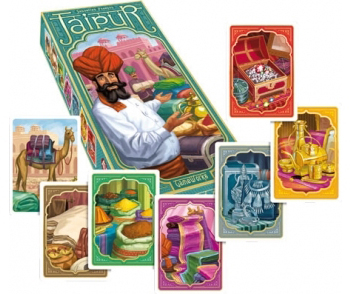
Unless you are fan of abstracts like chess (and I am typically not), fun two-player games are something of a rarity. We saw several in 2010, though, my favorite of which was Jaipur. Set in an Indian marketplace, players buy and sell commodities with a goal of collecting sets that can be melded for points. The game will feel familiar to anyone who has played rummy, but several novel twists (such as the use of “camel” cards, which players often need to get the goods they desire) elevate the game over its public-domain progenitor. With attractive illustrations, a compact size, and a brief playing time, Jaipur is a good “out and about” game, perfect for a quick match in a restaurant or between rounds at the pub. (more info)
Forbidden Island
Gamewright, 2 to 4 players, 30 minutes, $16
Castle Panic
Fireside games, 1 to 6 players, 60 minutes, $35
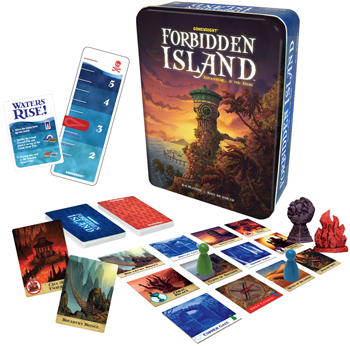
Cooperatives—games in which players form a single team, and compete against the system rather than against each other—are abruptly en vogue. Once largely ignored as gimmicky or dull, they have come into their own over the last few years, due in part to the popularity of Matt Leacock’s Pandemic. Now Leacock has taken the essence of Pandemic and adapted it for Forbidden Island, an adventure game aimed at a slightly younger (or drunker) audience, in which players race to gather treasure from an island that is sinking into the sea. If you couldn’t quite pull the trigger on Pandemic due to the macabre theme, higher price, or the perceived complexity, give this one a shot instead. Or try Castle Panic, which is also suitable for the adults-and-children (or adults-and-hot-toddies) crowd. In Panic, players collaborate to defend their castle from marauding hordes of monsters who are hell-bent on its destruction. Both games provide quick and engrossing play, without requiring families to butt heads any more than they already do during the holidays. (more info: Forbidden Island | Castle Panic)
Dungeons and Dragons: Castle Ravenloft Board Game
Wizards of the Coast, 1 to 5 players, 60 minutes, $65
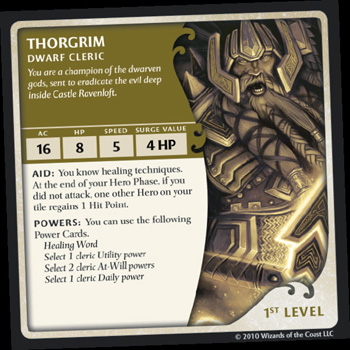
I’ve never been much of a roleplayer, but when the son of some friends got into D&D I picked up the Dungeons and Dragons: Castle Ravenloft Board Game for his benefit. When I brought it over to his house, though, he declared himself too “exhausted” to play. Being eight can wear a guy out, it seems. No worries: his parents and I, along with two other alleged adults, uncorked a few bottles of wine and had a grand old time without him. Ravenloft is another cooperative game, even more so than the RPG on which it is based as no one need play the Dungeon Master. Several decks of cards throw a dizzyingly assortment of monsters, treasures, and encounters your way, but the core rules could not be simpler: Move your hero, whale on some ghouls, and build the crypts as you go by adding tiles to an ever-expanding map. I expected this to be a mindless diversion, and was surprised to discover that some rudimentary discussion of tactics between players is essential to success. Better still, a variety of scenarios give you and your party different objectives to achieve, and an entire game only takes about an hour to complete. (more info)
Catacombs
Sands of Time Games, 2 to 5 players, 45 minutes, $55
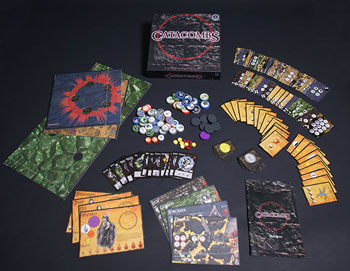
Maybe you like the idea of a Dungeons and Dragons-inspired board game, but want something even more removed from the realm of roleplaying. Catacombs takes the basic premise of the RPG—a group of adventurers delving deep into an underground lair and defeating monsters—and turns it on its head. Players attack monsters not by rolling dice and consulting tables, but by flicking the small wooden disks that represent their characters, shooting them across the playing area in the hopes of (literally) hitting their enemies. The heroes each have their own abilities (the wizard gets to fire adorable little fireballs, for instance), and one player gets to assume the role of the Overseer (the Big Bad that the rest of the player must locate and slay). This game is perfect for the fantasy enthusiast, or the guy who can’t resist the local pub’s shuffleboard table after a pint or five. (more info)
Last Call: The Bartender Game
Wattsalpoag, Inc., 2 to 5 players, 20 minutes, $32
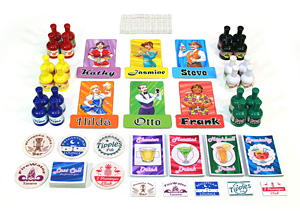
Last Call: The Bartender Game is not a drinking game, but it is a game about drinking…and you should drink while playing. Each player starts with several bottles of booze (tiny plastic replicas of booze bottles, alas), representing rum, brandy, gin, triple sec, vodka, and Irish cream. During play these bottles will be moved from person to person and, when a bartender has all the ingredients necessary for a drink, the player holding the corresponding card can play it. When a bartender has more booze than the drink requires however, he waters down the drink with ice cubes, which foist negative points onto the card player. Games themed around alcohol are rarely well designed (as the manufacturer assumes that the players will be too sloshed to notice or care), but there are enough clever touches in Last Call to ensure a good time for even the stone cold sober. (more info)
Modern Art: The Card Game
FRED Distribution, 2 to 5 players, 25 minutes, $16
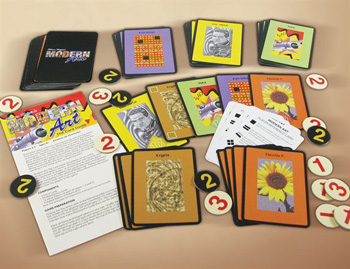
Many games include auctions, but the board game Modern Art—routinely cited as one of the best ever created—is nothing but auctions. So when this spin-off game was announced, it was assumed by all that it too would center solely entirely bidding. Surprise: Modern Art: The Card Game turns out to be Modern Art without the auctions, as unthinkable as a guitar without strings or Congress without idiots. Instead, designer Reiner Knizia has recreated the feel of the original but without the need for the mental number-crunching its bigger brother requires. The end result is a quick and light card game, suitable for any crowd. (Note that Modern Art: The Card Game is also available as Master’s Gallery—the gameplay of both is identical, but the former is cheaper and the latter looks better. As with so many things in life, you must choose between cash and beauty.) (more info)
Fresco
Queen, 2 to 4 players, 60 minutes, $60
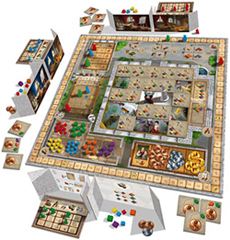
It’s a bit meatier than the others on this list but, if you’ve cut your teeth on simpler titles and are ready to inch your way to the big leagues, Fresco is a terrific introduction to the world of worker-placement games (which are all the rage these days). Players assign their five apprentices to a variety of tasks each turn: buying paint, mixing paint, restoring a portion of the fresco, or even just slacking off in the theater to improve their mood. Once you’ve mastered the basic game you can tackle one or more of the free expansions that are included in the box, a nice touch that will keep you playing this for a long time to come. (more info)
Cornerstone
Good Company Games, 1 to 4 players, 45 minutes, $40
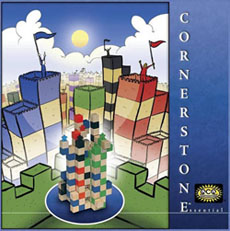
There are strategy games and there are dexterity games, and never the twain shall meet. Well, actually, the twain make nice in Cornerstone. Like a cross between Jenga and Crazy Climber, players in Cornerstone caaaaaaarefully place blocks on a tower, and strive to advance their pawn to the top of the building. Play continues until someone runs out of blocks or, more likely, causes the entire edifice to come tumbling down. Though a steady hand is the greatest asset, spatial reasoning and a gift for narrow escapes (when your climber gets trapped between towers) are useful as well, making this a crafty blend of planning and precision. (more info)
Convinced? Plug “board games” into Google Maps and find the specialty shop nearest your house. Or try one of the many online vendors: Funagain Games, Boards & Bits, Gamefest, or Amazon, to name a few.
Have fun, and happy holidays!

